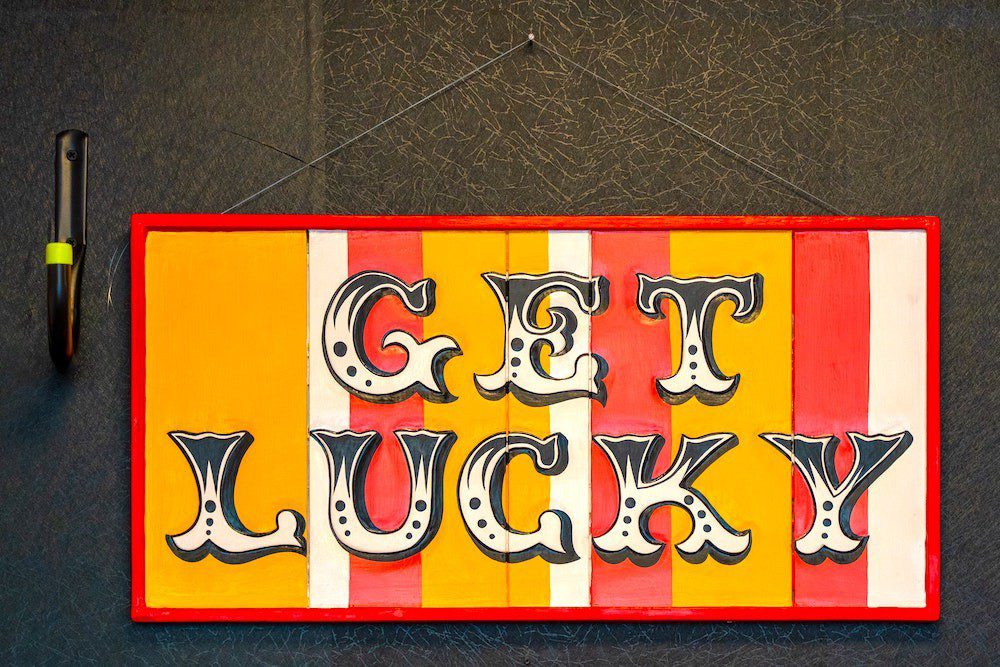The biggest criticism I get online is I’m a lucky son of a gun.
Criticism shows us our blind spots. Yes, I have been lucky.
Thanks to writing online, I quit my job last year. Thanks to my job in banking, I discovered cryptocurrencies back in 2013 and got an unfair advantage over late adopters. Thanks to LinkedIn, I’ve met some of the most well-known humans on the planet, including Tony Robbins and Gary Vaynerchuk.
Luck can become more intentional. It’s not entirely random. Here’s how I got unfairly lucky. Borrow what make sense for you.
Sometimes, the ducks line up in a way you don’t see or comprehend until later — Linda Caroll
Adopt a poker mindset
It’s easy to accept “the way things are.”
Polina Pompliano says “The luckiest people I know have a poker mindset — they are obsessed with finding a way to hack the system.”
That’s how I approach life. Everything is a game. Games can be played.
You can find hacks. You can play the game differently. Or you can simply spend more time playing the game than anybody else and get extra experience points.
Sales taught me this poker mindset. When the door of an opportunity closed I got forced to find another door, or lose my sales job. After a while you stop going through existing doors and construct the doors yourself.
Treat your goals as mini-games that have cheat codes.
1% better each day
Success highlight reels that flood social media teach us to believe in Hollywood fairytales and overnight success.
Reality isn’t quite so simple.
Rarely does someone create their own luck overnight. It’s taken me eight years online to create the type of luck I’m proud of — that also shows up in criticisms of my work.
The mindset I adopted is “1% better each day.”
I’m not looking for massive wins or huge opportunities. I simply take each area of my life — work, family, money, writing — and aim to improve them in small increments daily. I chose daily because that forces me to take action in each area every day rather than once a year.
The more you improve each area of life, the greater your life improves over 5-year or more timeframes.
Micro-habits
Jame Clear made us go nuts with his book Atomic Habits. It’s everywhere.
You can’t escape the power of habits. I love habits but I prefer micro-habits. They’re habits so small that if you didn’t track them you wouldn’t know they exist. Micro-habits that fuel my luck include:
- 30-minute walks to fuel creativity bursts.
- 15-minute showers to think through new ideas.
- Writing short stories down in Roam Research from my life, so I can tell them back to my kids one day (and include them in my writing).
- Telling my wife one thing each day I appreciate that she did. It’s so easy to focus on the negative. Appreciation flips our psychology 180 degrees.
- Tweeting a few short sentences each day to collect data on ideas I can expand on later.
Experiment with micro-habits. They supercharge your curiosity and increase your luck surface area.
The more persistent you are the luckier you get — Dan Go
Think less, act more
A near-miss with cancer in 2015 forced me to believe I was running out of time. As a former anxiety sufferer, I’m wired to overcompensate for failures that are unlikely to happen. It’s not all bad.
Anxiety wires your brain to be biased towards action.
As a result, I take a lot of action. If I don’t know what to do then I take action and see what happens. This brings more rejections and failures into my life, but with it comes a greater level of learning.
The truth is there’s only so much you can learn from traditional passive education. Until you try ideas yourself and feel the rush, it’s hard to know what path to take in life, and what goals to focus on.
When I stopped listening to university professors and started paying attention to the execution mindset of entrepreneurs, I got luckier.
Learn to send cold emails/messages
Early in my banking career I was telling my friend Andrew how good I was at sales and networking.
I sounded like a smart ass.
He’s older and wiser than me and said “Okay Chief, get a meeting with Richard Branson then.”
For the next few months I studied LinkedIn to see if I could meet Richard. Through the process I learned we’re 2–3 degrees away from our idols.
Eventually I got in touch with a man in the US. He was a crazy Kite Surfer and happened to be friends with Richard. After a series of bizarre events, I got invited to Necker Island to stay with Richard and hang out with the founder of Google Maps.
All of this became a reality because I got good at sending cold emails/DMs. I learned what a lot of people don’t know about reaching out:
- Make your first contact all about the other person. Be stupidly unselfish.
- Show you’ve done your research. Mention specific things from their life that you like or learned from them.
- Get to the point. The best in the world don’t have time for 2000-word emails.
- Show proof-of-work. People love numbers. Quote some stats from your job or things you’ve done online. Doesn’t have to be fancy.
- Stop asking for things. Aim for a reply, not a 3-hour meeting.
Comment on content from people you want to meet
In the last three months, I’ve connected with three of the biggest fitness account on Twitter. How?
I left comments on their tweets for more than 90 days straight. After they saw my face so many times and liked a few of my opinions, we connected in the DMs. Leaving comments is an underrated life hack. Go beyond “nice work” comments and add dot points, stories, and life lessons to your replies.
It’ll make you lucky with people you seek to connect with.
The luckier you are the nicer you should be and the nicer you are the luckier you’ll be — Morgan Housel

Photo by Nick Fewings on Unsplash
Have a side gig after hours
Writing online after work brought me opportunities I could never have dreamt of. When people get to know your story and what you’re an expert in it changes everything.
Suddenly you stop applying for opportunities and start filtering opportunities.
We’re all in control of what we do after work. It’s easy to waste all our free time on Netflix. For me, I binge-watch tv when my energy is low. Then Naval Ravikant said “startups die when they run out of energy.”
I reframed the quote to apply it to my life. After hours side gigs die when I run out of energy. So I worked on my energy levels.
- More naps
- Less drama
- Eating more plants
- Less doom-scrolling Twitter
My energy began to transform.
It got to a point where I had the energy after work to write and pursue different side gigs. That shift led to the life I have now that some call lucky.
No energy, no side gigs.
Learn Elon Musk-level patience
Luck runs out fast when you want results quick.
Elon Musk is helping humanity get to Mars faster. It’s taken a bloody long time, but the results are starting to show. I stole his mindset.
All of my life goals are in five-year blocks. If I set a new goal I expect it to take five years before I reach mastery. If it happens sooner, then great … although it rarely does.
Lack of luck is often lack of focus and lack of patience.
Celebrate the success of others in an uncommon way
When people in your network have children, get married, celebrate an anniversary, start their first business, or get a new job there’s a chance to congratulate them.
If you’ve been on Linkedin for a while, like me, you’ve seen how lifeless many people are when they celebrate your success.
A “happy birthday” message doesn’t mean much. Don’t be lazy.
Instead of sending a throwaway acknowledgment of a life event, be more specific. Use their name. Tell a short story. Help them reflect. Make them feel appreciated. Don’t be sucky though. Be genuine.
Pro tip: mention how they changed your life. People love to make an impact. Let them.
Example: “Happy 35th Birthday Andre. I still remember when you saved me from getting fired when you didn’t have to. That one comment you made changed the trajectory of my career. You may not get to read this but thank you, mate. Enjoy this special day with Rachel, Luke, and Francis.”
Help others to get luckier
Your reputation quietly creates future opportunities.
Helping others is how you score reputation points. The temptation is to be transactional in life. “I’ll do this for you if you do this for me. Sound good?” Nope, that’s a bad approach.
The help you give helps you too.
It allows you to refine your skills and learn the superpower of coaching.
The best payment you get is the one that comes in the form of a hidden opportunity that makes you look lucky — and that you can never trace the source of.
Systematize as much as possible
Success is no accident. My behind-the-scenes systems have made me the writer I am. Systems do the following:
- Save time
- Make you more money
- Allow you to outsource work
Build systems to get luckier.
Embrace cliches and the obvious
We know what it takes to get lucky in life. Yet it’s far too easy to avoid cliches such as work hard, be consistent, build your network, be kind.
The lucky life is obvious. All I’ve had to do is implement cliches rather than read them, gloss over them, and think I’m smart than them.
Cliches exist for a reason — because they work.
The crazy thing I love about luck
Let’s finish on an unexpected bang.
So far you might be thinking everything I touch turns to gold. Not quite. I’ve been incredibly unlucky too.
Last year I lost a large amount of money. I’ve had multiple devastating health challenges including a hearing condition called tinnitus. I’ve lost many career opportunities due to bad timing. And I’ve lost count of how many unlucky events caused my various startups to implode.
Oliver Flips taught me a valuable lesson I want to finish with:
Sometimes bad luck is good luck in disguise.
Without all of this bad luck I don’t think I’d be this unfairly lucky in life. The key isn’t to wait for luck. The key is to make your own luck. Take bad luck and turn it around. The feeling you get is incredible when you do it.


